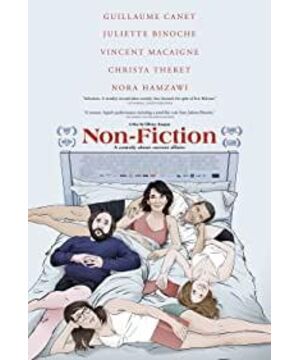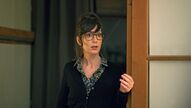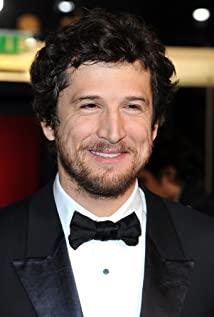Seeing that some netizens in the short comment area are discussing whether Doubles Vies or the English translation of Non Fiction is more appropriate, this topic is quite interesting, and the two titles are actually not particularly intuitive. I am inclined to the former, and just use this topic to briefly talk about the understanding of the title of the film-what does double-sided life refer to? (Just finished reading, record it, just for reference)
There is such a wide misunderstanding that double-sided life refers to one side is a cowardly family life, and the other side is a literary and artistic life that is eloquent. This seems to compress the book form and online writing issues involved in the film into a dispensable background. The large conversation is only to create a cultural and artistic atmosphere, which constitutes an irony with the messy private life. The problem with this understanding is that it ignores the confrontation in the rhetoric, and the two positions in the confrontation seem to better reflect the double-sided life that Assayas wants to show.
The film opens with writers and publishers arguing about writing online. From this debate to the first time the writer appeared in the music after his frank derailment, the characters kept chattering without stopping. If you don't pay attention to the theme of each dialogue and the relationship between the characters, it will be very messy and tedious. The structure is still very clear. First, each group of characters talks to form a confrontation in terms of positions (one party resorts to professional knowledge/tradition, the other party resorts to popular habits; since the fields of the four protagonists are different, they act in different fields. have roles with different positions), such as writers talking to publishers (writers stick to traditional ways of writing and think online writing is crap; publishers think online writing gives the masses more of a voice, and the masses are writing more and more Okay) - Publishers dinner with friends and family (Publisher and a friend are optimistic about the future of E-Books; There are still concerns about digitalization; subordinates believe that digitalization is an inevitable trend, and try to use algorithms to convince publishers that their work can be replaced by data, and publishers still believe that their subjective screening is valuable) - the writer's political assistant wife and writer and Discussions by his friends (politician assistants believe that politicians are not just running a set of characters, at least there are still the most basic political ideals, and they are dissatisfied with the writer’s friend who was a current affairs commentator; the writer thinks that friends are no big problem, and the public thought so) and so on. The side of the dialogue always engaged in the field stands on an elite standpoint, denying the ideological achievements of the mass media as lacking the proper order (in the writer's conversation with his wife, this is directly suggested); as a non-field Expert bystanders stand on the standpoint of public experience, believing that the traditional elite scheme is no longer tenable and does not conform to the development trend of the times. Everyone acts as an elite in their own field and a commentator in the field of others. In their own field, they try to defend tradition and deny the reliability of network knowledge in the information age. Arguing weapons, trying to dissolve traditional knowledge-power. These two roles are quite unconscious in the characters. The switching between the two roles of each person is so "natural" that they can even attack others with their weapons to defend themselves in the opposite direction. For example, the writer repeatedly emphasized the writer with the bookseller at the beginning. However, when explaining the "Seville" in the book to the actor's lover, he said that he borrowed material from the Internet; Possibilities are welcome, but the subordinates say they can even replace him with an algorithm. When they are "middlemen", they insist that their subjective choices still have value; and so on. This constitutes a double-sided life in a sense.
Then there's the writer's failure to get published, autobiographical writing in trouble (a reference to the character's ethical dilemma; radio's "White Ribbon"); the publisher may lose their jobs, the idea of an e-book doesn't work as well, not even as his wife had hoped The development trend of paper books; politician secretaries face politicians making mistakes, etc. The different degrees of frustration of the characters give them the opportunity to abandon their existing positions, and the final balance is achieved by surviving the crisis of double-sided life in another sense.
This layer of double-sided life is more obvious, and it is about intimacy - family life. Writers, actors, and publishers play the roles of defenders of their own families (marriage will never leave) and destroyers of other people's families (tracks must be released). The double-sided life in this sense forms a subtle connection with the first layer. In short, the film's handling is a smooth transition from the crisis of family life and a smooth transition from the crisis of cultural life. The fuse of this crisis is the writer's non-fiction writing. He shakes out his infidelity in the form of autobiographical novels (although he thinks he is clever and encrypted), and his lover is afraid that his husband will solve it. Password, too much mental pressure and decided to break up with the writer, ending the double-sided life in this sense. (Of course, the publisher's subordinate line does not seem to fit into this framework.) Here we also seem to be able to understand the reasons for the English translation of Non Fiction. It contains both a discussion of the work of art itself (slightly self-referential to the film), and also serves as a fuse for the collapse of two-sided life.
The end of the video is fairly simple. The actress no longer emphasizes that she is playing a crisis management expert; the writer admits that she can only write autobiographical novels... The characters each let go of their so-called professional authority and calmly accept that knowledge/power is not only in the hands of "experts", achieving balance between the two roles.
The film generally presents the thinking and living conditions of contemporary French intellectuals. It is precise, light and smooth. It is my favorite Assayas so far!
View more about Non-Fiction reviews











